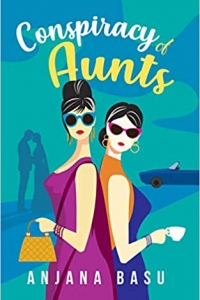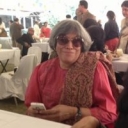
The Nymphet Aunt
It was hard to think of her as a nymphet—that implied a lissome slide of figure balanced with adept slyness. Or at least it did in Sreya’s vocabulary. The fact that Bubbles Mashi had been a nymphet once went ill with that image of pancake-white complexion and billowing bosom. Perhaps the stole balanced on the extreme slope of the shoulders could have qualified her for ‘nymphetness’, but as far as Sreya knew, nymphets pranced in singlets and gym slips, or perhaps it was the other way round.
Bubbles Mashi, she knew, had tried very hard to seduce her father’s best friend at her parents’ wedding. At least that was what Ma had said once in a grumpy moment of revelation. And if Ma had been fifteen at that wedding then Bubbles Mashi had been what, twelve? She apparently made goo-goo eyes between her snaky black locks at the unfortunate young lawyer who was standing by in dutiful attendance on the groom. It fitted with nothing that Sreya knew of her later aunt, that second cousin of her mother’s from another well knighted family. A family that had Queenie Mashi involuntarily swallowing her sniffs.
Bubbles Mashi’s grandfather had been known as ‘Ghari Babu’ by an awed generation groomed in punctuality by years of British rule which implied a hair trigger precision of timing that had those clock watchers awed. He had been known to leave his wife stranded in her silks and pearls if she was even a second late in descending the stairs to the portico where their Studebaker waited to carry them to a Tagore banquet or some other equally extravagant occasion. She would stand there helplessly watching the tail lights vanish down the long drive occasionally glancing at the fragile silver and rhinestone watch that had betrayed her yet again. But she dare not leave the portico because if it suited her husband, the car would return to carry her back to the ball in solitary splendour there to make her way alone to the hostess’ side. If it was a Tagore party the ladies would be in curtained seclusion and she could be certain of not making a spectacle of herself. If, however, it was some British official’s invitation, she would be heralded at the door and forced to walk the length of the ballroom by herself until she reached the host and hostess at the dais, feeling the eyes of the entire room in her back.
She was lucky not to be in purdah but sometimes she thought that there were worse things than being muffled in veils. Like her hostess’ ‘Late again, Lady Mitter? I trust there was no emergency to be dealt with,’ uttered with the piercing shrillness of a koel’s scream at midnight—why had any poet ever thought of koels as romantic?—while her husband stood at the latt sahib’s elbow, an expression of utter boredom on his face. Lady Mitter would mutter her excuses in her stumbling English and fade into the nearest velvet curtain as soon as she possibly could, making sure not to lose sight of her husband. She had no wish to be abandoned in a British ballroom—her own stairs were different.
Life with Ghari Babu was the awareness of a constant ticking—at a later age it would be compared to living with a time bomb. Lady Ajita Mitter, on the other hand, had no such luxury of metaphor. It was a matter of the perfectly roasted mutton, the well-seasoned mint sauce with not a trace of the Indian herb about it, the kakori kebab at the right stage of melt-in-the mouth-ness. All served by manservants in white gloves and white jackets circled with red cummerbunds while Ghari Babu glared at them, defying them to spill even a drop of gravy or wine or whatever it was that they were then serving. Needless to say, he had an ‘English’ cook in one of his kitchens, a demented Russian who had skipped ship from Shanghai and who served up menus that never quite matched the handwritten cards that adorned the large dining table.
‘Excessive,’ Ma had sniffed once but as Sreya knew, her father and mother had gone to no such heights of splendour, especially after their marriage had gradually fallen apart, though yes, now that she came to think of it, her Queenie Mashi had. How Lady Mitter managed was a mystery, but despite her frequent late appearances, she held on to her serenity and presented her lord and master with a fragile daughter who lived long enough to be married and in her turn produce another daughter before fading out of the world not long after. Bubbles Mashi was named Babli after a bird, but with the inevitable anglicisation that accompanied toasts to the new baby drunk in the Governor’s presence. That was an era of Bubbles—the Maharajah of Jaipur’s son was named Bubbles for very much the same reason and there must have been a hundred and one other frothy spirits in the presidencies and principalities. It was probably the champagne that was responsible for turning Bubbles Mashi into a nymphet—Sreya could think of no other logical reason.
Bubbles was whiter than white even as a baby, almost as white as Queenie Mashi’s Kabuki make-up. And she had bubbles of black curls framing her face. Ghari Babu took her whiteness as a credit to his superior genes and ignored the fact that her eyes were round but small and that her chin grew into a trowel as she grew older. In any case, a white complexion was all that mattered in those days—it was far more important than fineness of features. Sreya’s own mother Regina had been famous for her ‘Yehudi’ fairness and Ma, Sreya thought with a wince, had never been bothered about beauty. How could she when she had her sister to compete with? Ma and Queenie Mashi had fought each other almost tooth and nail in the beauty stakes as children but confronted with Queenie Mashi’s jaw-dropping, too-beautiful-for-mortal-eyes-to-behold features and camellia complexion, Regina’s goose down, soft ivory complexion paled into insignificance
Bubbles Mashi, on the other hand, had no competition. She was pampered to an inch by her father—or so Ma had said. Ghari Babu hired an English nanny for her and the nanny would sit beside him with the baby in her arms as he drove on the Strand in the afternoon. If it was winter, Bubbles Mashi would be swathed in the finest cashmere—pashmina was only good enough for her mother. Come summer and it would be fragile laces because by then she had almost graduated to dresses. Bubbles knew that she could control her world with the stamp of a foot—or at any rate she could control her grandfather, which was almost as good as controlling the world.
Listening to those stories, Sreya had secretly wondered how Lady Ajita had managed the situation. Sreya knew she had a son who was almost the same age as Bubbles and the two had been brought up side by side like brother and sister in one of those confusing tangles that plagued most zamindari family trees—they all called Bunny ‘Uncle’ or ‘Mama’ rather than the more correct ‘Dadu’ or ‘Grandfather’. Oddly enough, Ghari Babu had not invested too much of his clockwork precision in training his son beyond teaching him a certain finesse in matters of food and wine and racehorses while devoting his entire attention to his dazzling granddaughter. Uncle Bunny was to buy a thoroughbred later for a ruinous price and race it with persistence and very little luck for several seasons at Ascot while Bubbles Mashi was setting sail on her siren’s voyage in Europe.
The children had tutors and governesses—‘an Anglo Indian’, Ma and Queenie Mashi had exclaimed once as they were shaking their heads over yet another of Bubbles’ doings. Sreya had imagined them heavily made up and powdered into a generation of Merle Oberons, since that was as close as she could get to the real thing. Perhaps the Merle Oberons were responsible for what Bubbles became, seducing her with eyeshadow and experienced charm.
As she grew up, teetering between the War and the problems caused by India’s political upheavals, Ghari Babu had less and less time to devote to his family, while Lady Ajita surprised everyone by taking a course in radio communication codes. It kept her out of the house and away from any fretful children’s problems. When she was home, she reportedly used to loll on a long leather sofa and listen to the Armed Forces radio, answering questioners with a simple, ‘It is practice for my work.’ Ma had apparently seen her at it on one of her rare visits to Calcutta. She had waved a long hand tipped with flaming red nail polish—Durogloss she called it—at Ma and when asked where Bubbles and Bunny were, just shrugged.
Ma took it for one of those mysterious signs that Ghari Babu was realising the impermanence of the British rule. She had seen it expressed in different ways in her own family—Granny Hansabati sitting at a spinning wheel experimenting with khadi, as Gandhi had been urging in print and radio, Queenie putting away any cottons she may have been tempted into buying from Whiteway Laidlaw or, if you looked at the men, her father-in-law assembling evenings of heated political debate where only prominent Bengalis were present. It required a careful balancing act between liberalism and sedition—Independence was obvious but no one quite knew when. Ghari Babu, on the other hand, was known to lean heavily towards the British and the exercise for him was therefore, far more difficult. For Ma, plagued with problems of missing sisters-in-law and indifferent husbands, that was as much as she would allow herself to notice.
Sreya’s own feeling was that Lady Ajita was getting her own back for those stranded evenings, but that was only a theory.
The case of Bubbles, however, was something else. In a way she was like Queenie Mashi—except that Sreya’s most immediate aunt had never fancied herself a nymphet and draped herself in formal weaves and silks. Bubbles, on the other hand, acquired a fine line in chiffon saris from the maharanis that Ghari Babu brought her into contact with and complemented their transparency with low cut blouses—a story that Sreya heard the day that she was being measured for her first blouse with her mother poised like a figurehead on a chair, eyes snapping at the tailor. The neckline, she stated, had to be modest. ‘None of these anglicised cuts. Here,’ stabbing a finger that traced a tingling line between Sreya’s collarbones.
Sreya half wondered whether Bubbles Mashi had anything to do with Ma’s fussiness about clothes—not that she knew more about her than the hissing coils of aunts provided. The photographs showed a far from sylph-like figure armed with an amplitude of curves. The most prominent being the low dipping curve of the blouse’s neckline dimly discernible through the veiling fabric. Would she have dressed like that at her parents’ wedding then, when she had circled round the best man?
Not that chiffons were allowed at weddings no matter how anglicised you were. Ma’s memories of Bubbles on that occasion were half-remembered since she was confined to a gaggle of aunts, grandmothers and school friends—appropriate company for a new bride. Later Baba had told her about Bubbles weaving her spells and speculated on the possibilities of their making a match of it. ‘She must be the right age… How old is she?’
Apparently, she had been eleven and too young for an enlightened grandfather to contemplate marrying off. Ghari Babu prided himself on his progressive bent of mind, so Bubbles was allowed to continue doing whatever she did unhindered—the only stipulation being that she finish school. There was some hope that the Irish nuns would ultimately impose their discipline on her or at any rate improve her handwriting before she left. Judging by the postcards she scattered her progresses with, that hope went unrealised.
Six years later, when she stood on the brink of acceptable matrimonial eligibility, Bubbles was sent to visit friends in Bombay. It was felt that the greater sophistication of that glittering city would give her the finishing gloss that the nuns with their backboards and books on the head had not been able to achieve. Lady Ajita was not entirely in favour of this but given the fact that no appropriate grooms-to-be had yet presented themselves, she finally acquiesced.
Daringly, Bubbles was sent by plane. Bunny took a photograph of her standing on the runway, the end of her sari fluttering like a great wing behind her. In her bag she had a pair of slacks and a blouse carefully hidden under the piles of saris. She would be greeted at the Bombay airport by Ghari Babu’s friend’s wife, who had agreed to meet her at the foot of the plane steps.
Needless to say, Bubbles was airsick and found comfort in the attentions of a steward in a starched white uniform. He stood by her proffering damp lemon-scented napkins that she could dab her temples with and peppermint to chase her queasiness away. She was comforted by the whiffs of lemon and the strong male hand that held up the napkins. It was the first time she had been without a member of her family in attendance and as she batted her eyes at the steward over the edge of the napkin she had a feeling that there was a lot to be said for it. In the time it took for the flight to reach Bombay, the young man was at her constant beck and call, much to the irritation of his fellow air hostesses.
He carried her shocking pink vanity case and an armful of magazines for her as she wafted her way down the steps only to be met by her hostess who curtly waved the young man away without giving him a chance to get Bubbles’ phone number. He stood on the steps, automatically bidding disembarking passengers farewell and out of the corner of his eye watching the shocking pink bag disappear into the depths of a limousine and realising that she was far above his sphere.
About the Author



Comments